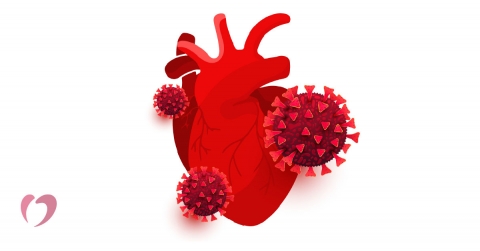COVID-19 and Heart Health

It’s important to know that a history of heart disease raises your risk for having a severe case of COVID-19. This truth became evident early in the pandemic, and we are still learning all the ways and reasons that coronavirus affects the heart. While heart disease does not increase the risk of contracting the virus, it does increase the risk of severe complications.
The virus that causes COVID-19 latches on to cells throughout the body, including in your cardiovascular system. The effect on your heart could include arrhythmias, inflammation, reduced blood flow to the heart, and even sudden cardiac death. One response noted early in the pandemic included an increased risk of blood clots throughout the body. When the heart is inflamed from an infection, the resistance to blood clots is lower. Clots can reduce the oxygen in the blood getting to the heart, or even block blood flow to the heart completely. Myocarditis, or inflammation of the heart seen in severe COVID-19 cases, results from the virus directly attacking the heart, or from a cytokine storm, which is a large reaction of your immune system to the virus that can kill tissue and damage your organs.
Lingering effects after initial recovery
One thing doctors have seen over the course of the year is that, even after recovery from the virus, there can be lingering symptoms. Mild myocarditis is common after recovery from COVID-19, and images taken months after recovery have shown heart damage. Even mild cases can result in abnormal heart rhythms, a heart rate that jumps with the slight exertion, or other changes in how the heart functions.
There is concern these lingering effects could raise risk of heart failure or other conditions in the future. How long this damage lasts is unknown at this time, and research is ongoing into the long-term effects of COVID-19 infection. If you have recovered and are concerned about lingering cardiac symptoms, make an appointment with one of our Oklahoma Heart Hospital physicians for further testing and monitoring.
Living in the pandemic
Life during the pandemic also affects your heart health. One of the big problems cardiologists are seeing is the hesitancy to seek medical treatment. Delayed medical treatment leads to worsening outcomes and greater damage. Whether it’s a concern about potentially contracting COVID-19 while seeking treatment or a delay in treatment due to overcrowded medical facilities, we have seen a greater number of people delay visiting a doctor for both routine medical treatment and more urgent medical concerns. Even delays in routine screening can lead to delays in identification and treatment of arrhythmias and other heart problems.
The pandemic in general can increase stress and a change in routine can mean an increase in unhealth lifestyle choices. Choosing a healthy lifestyle is even more important during the pandemic to lower your overall risk for heart conditions, thereby lowering your risk for severe COVID-19. Aim to eat healthy meals and get plenty of exercise, including walking and just moving more in general.
Prevention
Although we are nearly a year into the pandemic and anxious to get back to normal life, the best way of protecting your heart during the pandemic is by being proactive and continuing to take precautions. Continue all the best practices that we’ve talked about throughout the year. Wash your hands frequently, wear a mask, and continue to distance from others. These basic measures will greatly reduce your chances of contracting the virus. Equally as important, stay on top of your health. Continue to see your doctor for routine exams and preventative testing. If you are having or believe you are having any type of cardiac issue, seek medical attention promptly.
Pandemic life can be stressful, limiting, and very different from our usual routines. Look for ways to care for your body and mind as a whole during this time, knowing that each of those choices also benefits your heart. Choose a heart-healthy diet rather than junk food. Continue to exercise, or create new exercise routines, to help both your stress level and your heart.
COVID-19 has many effects on heart health, both directly and indirectly. Knowing your risk level and doing what you can to avoid infection as much as possible is vital. Continue to practice healthy habits and don’t neglect your routine healthcare visits during this time. Most importantly, if you are having symptoms of a heart attack or stroke, call 911 or seek immediate medical attention.




